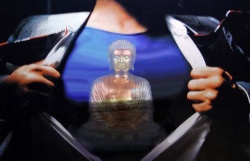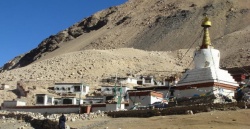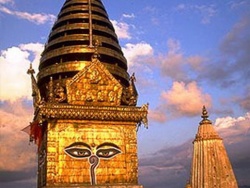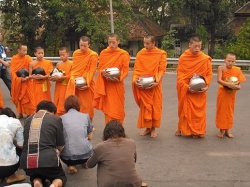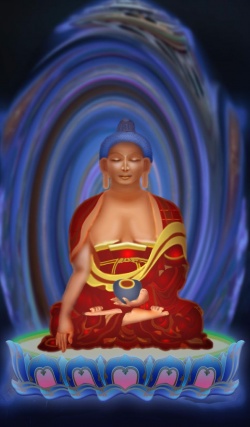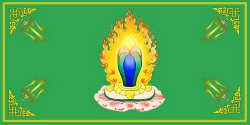Jaliya Sutta
Preached to Jaliya and Mandissa at the Ghositarama on the question as to whether body and soul are one and the same (D.i.159f). The Sutta is identical with the second part of the Mahali Sutta and was once probably included in it.
[This Sutta having been incorporated, word for word, as §§ 15-19, inclusive, in the last Sutta, the reader is referred to the translation given there.
The Mahâli Sutta must have already included, when the Dîgha was put together, this Gâliya episode.
For there would otherwise be no reason for the Mahâli Sutta being put into the Sîlakkhanda Vagga, the Sîlas being contained only in that episode.
Why then should the episode appear also again, in full, as a separate Sutta?
Is it merely because of the importance of the question?
We have another instance of a similar kind, where the episode of Nigrodha's question, only referred to at § 23 of the Kassapa-Sîhanâda Sutta, is set out afterwards, in full, in the Udumbarîka Sîhanâda Sutta (No. 25 in the Dîgha).
But there the whole episode is not given twice in full.
Such cross-references are fairly frequent in the Pitakas, and are of importance for the history of the literature.
One of the most striking cases is where the Samyutta quotes a Sutta, now contained in the Dîgha, by name. (Sakka-pañha Sutta, S. III, 13; compare Sum. I, 51; Mil. 350.)]
is the soul distinct from the body
The Buddha was staying at Kosambî, in the Ghosita pleasaunce.
There two recluses, Mandissa the wandering mendicant, and Gâliya the pupil of Dârupattika (the man with the wooden bowl), came to the Blessed One, and exchanged with him the greetings and compliments of politeness and courtesy, and stood reverently apart. And so standing they said to him:
'How is it then, O venerable Gotama, is the soul the same thing as the body? Or is the soul one thing and the body another?'
'Listen then, Sirs, and give heed attentively, and I will speak.'
'Very good. Sir: said those two mendicants in assent, and I spake as follows:--
[Here follows the whole of the exposition given in the Sâmañña-Phala Sutta, §§ 40-75, that is to say:
1. The appearance of a Buddha and his preaching.
2. The awakening of a hearer, and his entry into the Order.
3. His self-training in act, word, and speech.
4. The minor details of morality which he observes.
5. The absence of fear, confidence of heart thence resulting.
{1. See my' American Lectures,' pp. 136-141; and Sum. I, 314-316.}
6. The way in which he learns to guard the door of his senses.
7. The Constant self-possession he thus gains.
8. The power of being content with little, with simplicily of life.
9, The emancipation of heart from the five hindrances--covelousness, illwill, sloth of body and mind, excitement and worry, and perplexity.
10. The resulting joy and peace that he gains.]
2. 'Then estranged from lusts, aloof from evil states, he enters into and remains in the First Rapture--a state of joy and ease, born of detachment, reasoning and investigation going on the while.
Now, Sirs, when a Bhikkhu knows thus and sees thus, would that make him ready to take up the subject: "Is the soul the same thing as the body, or is the soul one thing and the body another?"'
'Yes, it would, Sir{1}.'
'But I, Sirs, know thus and see thus, And nevertheless I do not say either the one or the other,'
3, 4. [The cases are then put of a Bhikkhu who has acquired the second, third, and fourth Raptures (D. II, 77-81) and the knowledge arising from insight (Ñâna-dassana; D. II, 83, 84); and the same question, reply, and rejoinder are given in each case.]
5, 'With his heart thus serene (&c. above, p, 85), he directs and bends down his mind to the knowledge of the destruction of the Deadly Floods, He knows as it really is: "This is pain." He knows as it really is: "This is the origin of pain." He knows as it really is: "This is the cessation of pain." He knows as it really is: "This is the Path that leads to the cessation of pain." He knows as they really are: "These are the Deadly Floods." He knows as it really is: "This is the origin of the Deadly Floods." He knows as it really is: "This is the cessation of the Deadly Floods." He knows as it really is: "This is the
{1. The Siamese edition reads: 'No, it would not, Sir.' On the idiom kallam etam vakanâya compare A. I, 144; M. II, 211.}
Path that leads to the cessation of the Deadly Floods." To him, thus knowing, thus seeing, the heart is set free from the Deadly Taint of Lusts, is set free from the Deadly Taint of Becomings, is set free from the Deadly Taint of Ignorance.
In him, thus set free, there arises the knowledge of his emancipation, and he knows: "Rebirth has been destroyed. The higher life has been fulfilled. What had to be done has been accomplished. After this present life there will be no beyond!"
'When a Bhikkhu, Sirs, knows thus and sees thus, would that make him ready to take up the question: "Is the soul the same as the body, or is the soul one thing and the body another?"'
'No, Sir, it would not{1}.'
'And I, Sirs, know thus and see thus. And nevertheless I do not say either the one or the other.'
Thus spake the Blessed One; and two recluses, pleased at heart, exalted the word of the Blessed One.
Jāliyasuttaṃ
Dvepabbajitavatthu
378. Evaṃ me sutaṃ – ekaṃ samayaṃ bhagavā kosambiyaṃ viharati ghositārāme. Tena kho pana samayena dve pabbajitā – muṇḍiyo ca paribbājako jāliyo ca dārupattikantevāsī yena bhagavā tenupasaṅkamiṃsu; upasaṅkamitvā bhagavatā saddhiṃ sammodiṃsu. Sammodanīyaṃ kathaṃ sāraṇīyaṃ vītisāretvā ekamantaṃ aṭṭhaṃsu. Ekamantaṃ ṭhitā kho te dve pabbajitā bhagavantaṃ etadavocuṃ – ‘‘kiṃ nu kho, āvuso gotama, taṃ jīvaṃ taṃ sarīraṃ, udāhu aññaṃ jīvaṃ aññaṃ sarīra’’nti?
379. ‘‘Tena hāvuso, suṇātha sādhukaṃ manasi karotha; bhāsissāmī’’ti. ‘‘Evamāvuso’’ti kho te dve pabbajitā bhagavato paccassosuṃ. Bhagavā etadavoca – ‘‘idhāvuso, tathāgato loke uppajjati arahaṃ, sammāsambuddho…pe… (yathā 190-212 anucchedesu evaṃ vitthāretabbaṃ). Evaṃ kho, āvuso, bhikkhu sīlasampanno hoti…pe… paṭhamaṃ jhānaṃ upasampajja viharati. Yo kho, āvuso, bhikkhu evaṃ jānāti evaṃ passati, kallaṃ nu kho tassetaṃ vacanāya – ‘taṃ jīvaṃ taṃ sarīra’nti vā ‘aññaṃ jīvaṃ aññaṃ sarīra’nti vāti. Yo so, āvuso, bhikkhu evaṃ jānāti evaṃ passati, kallaṃ tassetaṃ vacanāya – ‘taṃ jīvaṃ taṃ sarīra’nti vā ‘aññaṃ jīvaṃ aññaṃ sarīra’nti vāti. Ahaṃ kho panetaṃ, āvuso, evaṃ jānāmi evaṃ passāmi. Atha ca panāhaṃ na vadāmi – ‘taṃ jīvaṃ taṃ sarīra’nti vā ‘aññaṃ jīvaṃ aññaṃ sarīra’nti vā…pe… dutiyaṃ jhānaṃ…pe… tatiyaṃ jhānaṃ…pe… catutthaṃ jhānaṃ upasampajja viharati. Yo kho, āvuso, bhikkhu evaṃ jānāti evaṃ passati, kallaṃ nu kho tassetaṃ vacanāya – ‘taṃ jīvaṃ taṃ sarīra’nti vā ‘aññaṃ jīvaṃ aññaṃ sarīra’nti vāti? Yo so, āvuso, bhikkhu evaṃ jānāti evaṃ passati kallaṃ, tassetaṃ vacanāya – ‘taṃ jīvaṃ taṃ sarīra’nti vā ‘aññaṃ jīvaṃ aññaṃ sarīra’nti vāti. Ahaṃ kho panetaṃ, āvuso, evaṃ jānāmi evaṃ passāmi. Atha ca panāhaṃ na vadāmi – ‘taṃ jīvaṃ taṃ sarīra’nti vā ‘aññaṃ jīvaṃ aññaṃ sarīra’nti vā…pe… ñāṇadassanāya cittaṃ abhinīharati abhininnāmeti…pe… yo kho, āvuso, bhikkhu evaṃ jānāti evaṃ passati, kallaṃ nu kho tassetaṃ vacanāya – ‘taṃ jīvaṃ taṃ sarīra’nti vā ‘aññaṃ jīvaṃ aññaṃ sarīra’nti vāti. Yo so, āvuso, bhikkhu evaṃ jānāti evaṃ passati kallaṃ tassetaṃ vacanāya – ‘taṃ jīvaṃ taṃ sarīra’nti vā ‘aññaṃ jīvaṃ aññaṃ sarīra’nti vāti. Ahaṃ kho panetaṃ, āvuso, evaṃ jānāmi evaṃ passāmi. Atha ca panāhaṃ na vadāmi – ‘taṃ jīvaṃ taṃ sarīra’nti vā ‘aññaṃ jīvaṃ aññaṃ sarīra’nti vā…pe….
380. …Pe… nāparaṃ itthattāyāti pajānāti. Yo kho, āvuso, bhikkhu evaṃ jānāti evaṃ passati, kallaṃ nu kho tassetaṃ vacanāya – ‘taṃ jīvaṃ taṃ sarīra’nti vā ‘aññaṃ jīvaṃ aññaṃ sarīra’nti vāti? Yo so, āvuso, bhikkhu evaṃ jānāti evaṃ passati, na kallaṃ tassetaṃ vacanāya – ‘taṃ jīvaṃ taṃ sarīra’nti vā ‘aññaṃ jīvaṃ aññaṃ sarīra’nti vāti. Ahaṃ kho panetaṃ, āvuso, evaṃ jānāmi evaṃ passāmi. Atha ca panāhaṃ na vadāmi – ‘taṃ jīvaṃ taṃ sarīra’nti vā ‘aññaṃ jīvaṃ aññaṃ sarīra’nti vā’’ti. Idamavoca bhagavā. Attamanā te dve pabbajitā bhagavato bhāsitaṃ abhinandunti.
Jāliyasuttaṃ niṭṭhitaṃ sattamaṃ.
